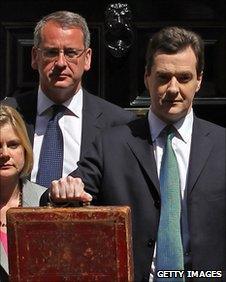Bank bonuses 'must be restrained'
- Published

Mr Hoban (back) confirmed plans for two new bank taxes announced in the Budget
A Treasury minister has called on banks to exercise restraint in paying bonuses when the public and private sectors are under pressure to cut labour costs.
Financial Secretary Mark Hoban said banks needed to show they operated in a "fair and stable" way in allocating bonuses this year.
He also confirmed the government was looking at ways to tax banks' profits.
Last week, the European Parliament approved a deal placing new limits on bankers' bonuses from next year.
Under the terms of the deal, bankers will receive no more than 30% of their bonus immediately and in cash, a limit that falls to 20% for larger bonuses. Remaining payments will be deferred and linked to long-term performance.
'New chapter'
Mr Hoban was addressing an annual dinner of the British Bankers' Association (BBA) at Mansion House, where he was given a "cool reception" by bankers, according to BBC business correspondent Simon Jack.
The Conservative minister said: "We have the opportunity to send a clear message to the public that the banking system now operates in a way that is fair and stable and no longer rewards employees based on short-term performance whilst leaving investors and taxpayers exposed to the long-term risks."
He said that by "visibly reforming the way they operate, banks can show they exist to serve the whole economy, not just their own interests".
Bonuses 'regulated'
However, the bonus culture was later defended by the head of the BBA, Angela Knight, who had described the reputation of bankers as akin to a "a leper colony to some, or carriers of bird flu to others" at the dinner.
She said that bonuses in the UK were already regulated and were assessed against "proper performance figures".
"The whole question of pay was put into regulation last year," she told BBC Radio 4's Today programme. "The only country in the G20 to do it was here in Britain."
'Myths'
In a separate speech to the BBA on Tuesday, the Royal Bank of Scotland boss, Stephen Hester, warned of public misperceptions about banking.
"If we do not constructively challenge these myths, then we will be seen as drifting further away from the public interest, with potentially damaging consequences," he said.
As an example of these "myths", he mentioned the belief that "banks have little interest in supporting small businesses", whereas he said the truth was that it was the small businesses who had little interest in borrowing.
He also attacked the "casino label" for investment banking, claiming that this business financed the building of schools and hospitals, and helped people to buy homes.
Mr Hester welcomed government plans for a banking commission.
"To date, there has been too much focus on potential remedies, without taking the important first step to actually learn the lessons of the financial crisis."
He hoped the commission would agree with his view that speculative "proprietary trading" had little to do with the crisis.
New bank taxes
Mr Hoban, in his speech, confirmed that the new coalition government planned to introduce two new taxes on banks.
The first will be a "bank levy" aimed at raising £2.5bn ($1.7bn), that was included in George Osborne's first budget and will apply to banks' risky borrowing.
The Treasury launched a consultation on this tax on Tuesday, the day after Mr Hoban's speech.
The idea is to discourage banks from relying on the kind of short-term unguaranteed borrowing - such as repos, wholesale deposits and interbank deposits - that evaporated during the financial crisis, in what amounted to a modern-day bank run.
Ordinary retail deposits, which are government guaranteed and a more stable source of funding for banks, will probably be exempt from the bank levy.
Secondly, a "financial activities tax" will be charged on the profits earned by banks plus the bonuses they pay.
The two taxes were both originally proposed by the IMF in April to be applied by governments across the globe.